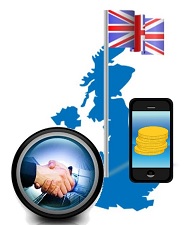Weve teams with MasterCard to accelerate adoption among businesses
Weve, an upcoming mobile commerce platform in the United Kingdom, has announced that it has partnered with MasterCard. This partnership is meant to make the launch of Weve throughout the UK smooth as well as accelerate the rate at which merchants adopt the platform. The United Kingdom is quickly becoming one of the most attractive mobile payments market in the world. More consumers are using their mobile devices to shop online, claiming that shopping from a mobile device is more convenient.
Weve aims to provide organizations with platform that can effectively engage consumers
Weve was introduced last year after it had won the approval of the European Union. The platform represents a joint venture from Vodafone, EE, and O2, three of the largest telecommunications organizations in the United Kingdom. Weve is meant to serve as an all-encompassing platform that banks, retailers, and advertisers can use to engage mobile consumers. Such platforms are becoming more important as consumers begin to rely more heavily on their smartphones and tablets in daily life.
Partnership with MasterCard may attract more attention to mobile commerce platform
In partnering with MasterCard, Weve may be able attract the attention of banks and other organizations more quickly. Banks and retailers typically invest in third parties to develop mobile commerce platforms for them, but these platforms are often quickly developed and offer limited features to consumers. Through Weve, businesses will have a well-developed platform they can use to engage consumers more effectively and provide these consumers with a favorable experience.
Weve may not win favor with iOS consumers without NFC devices
Weve anticipates that it will see widespread rollout in the United Kingdom beginning in 2015. The platform is expected to be used as part of more than 300,000 point of sale systems in the country. The problem, however, is that the platform is based on NFC technology, meaning that those without NFC-enabled mobile devices, such as those with iOS devices, will not be able to make use of Weve. This could limit the potential acceptance than Weve receives in the United Kingdom.
The same forecasts have seen those devices outselling notebooks in 2014.
Although smaller sized tablets have been growing in popularity over the last few years, it is phablets that are expected to be the hot mobile devices, this year, as at least one analyst has already predicted that they will become the top gadget in terms of sales.
The Kindle Fire’s 7 inch tablet exploded into the market, changing the consumer expectation for screen size.
That device was first launched near the end of 2011. They have gone on to produce many more mobile devices at that and small tablet model sizes. Others have jumped into that mobile devices market, as well, including the Nexus 7 from Google. Though some screen size is lost, there are a number of appealing advantages to a smaller sized gadget. Among the primary benefits that have been identified by users are that they are more portable, they are lighter, and they are typically less expensive than models that are 8 inches and larger.
These mobile devices have taken off due to lower price and functionality alone, but there is more to this market.
These small tablets may be the volume leader at the moment, but it is anticipated that a whole new class is about to take over. The Galaxy Note kicked this trend started, when Samsung’s gadget was nicknamed a phablet. Since then, devices with displays between 5 and 6 inches have been growing in popularity as they combine the practicality of a small tablet with the capabilities of a smartphone.
Technology analyst Bob O’Donnell, from Technalysis Research, has forecasted that this year, phablets will become popular to such a degree that they will begin outselling 7 inch tablets before the year comes to a close. The prediction is that more than 240 million phablets will be shipped this year, when compared to 158 million small screen tablets (7 to 8 inch displays), and 173 million notebooks.
O’Donnell pointed out that “We are in the midst of a dramatic recasting of the entire market for devices.” He said that this may be the next phase in entirely redefining computing, once again. It will mean that computing can occur in a new way and in new places. The outcome, he said, is that there will likely be yet another considerable shift in influence and power among the various manufacturers.



